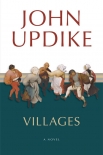Villages by John Updike (best summer reads of all time .TXT) 📗

- Author: John Updike
Book online «Villages by John Updike (best summer reads of all time .TXT) 📗». Author John Updike
Handing up clothespins to Momma or Grammy was one of his first ways of being useful. The little clothespin basket had no fresh wicker smell, it was dark from being handled, by women’s hands, year after year, dating back to before Grammy, who had inherited it, a coil of fiber bound into a bowl hard as clay, made of “sweetwater grasses” by slaves or Indians, he didn’t know which. The basket had the musky darkness of the ancient time before cars and movies, radios and light bulbs, long before Owen was born. It was a little heavier and stonier than expected when you touched it, whereas the clothespins were a little lighter. With their two legs and flat knobs at the other end like sailor hats, they were smooth in his hand and could be turned with colored pencils into staring, smiling little men, wearing sailor hats and blue coats. They could be made to do tricks, stuck together like acrobats.
It was too bad Alice wasn’t prettier and taller, and that, like Owen, she got good marks at school. She was bright, which made her boring. He was drawn to the tough, daredevil girls from families his own looked down on, because of some whispered ancestral taint or scandal or because the father drank or did manual labor or was not nice to the mother. Did this not-niceness take the form of hitting her, or calling her names, or something else, furtive and dirty, that happened? Even in Willow, let alone Alton, there were places, bars and pool halls and bowling alleys, that smelled of misbehavior, of sinful transaction. In the nameless gravel alley that ran beside the hedge of Owen’s yard and then at a right angle behind the asbestos-shingled chicken house his grandfather had built when he first moved to Willow, and then past several garages and small barns at the bottom of people’s yards and a tarpaper shack called a gun shop where a one-eyed man named Smokey Frye noisily pounded and ground metal at odd hours, there was a windowless cinder-block building that a sign above the door identified in hand-painted letters as the Gifford Pinchot Wildlife Society, from which drifted the sounds of men drinking and playing cards. The grown-ups of Willow needed their fun, and for young people there was a recreation hall, the “Rec Hall,” opposite the elementary school, where kids older than Owen danced and played pinball and smoked outside the doors. It was said that a girl two classes ahead of his, Carol Wisniewski, had let herself be fucked by Marty Naftzinger standing up, there in the shadowy, gritty space between the Rec Hall and the factory building beside it, where they made hosiery and then, during the war, parachutes.
Willow during the war, as Owen went from eight to twelve, was like a prairie village brushed by black clouds that sweep low overhead but do not discharge their tornado, though at the Scheherazade there were newsreels of airplanes turning cities into fields of fire and of GIs storming sandy island beaches strafed by fanatical Japanese who had to be burned out of their caves with flamethrowers like nests of insects. While the great Eurasian continent from end to end seethed with moving masses and vast death and the oceans drank torpedoed ships, North America held its breath, a land of women and children and old men and price controls and rationing tokens and war stamps and Hollywood comedians on the radio. Yet the tingle of global gambles filled the air and enthralled their island of peace: there was a speeding-up, a sense of stakes higher than the old proprieties. Carol Wisniewski let herself be fucked by Marty Naftzinger standing up, and Momma took a job at the parachute factory and did plane-spotting on the roof of the fire station, playing solitaire with a special deck of cards, and Grampy came out of his retirement to work on the borough highway crew, and Daddy put on a warden’s helmet in air-raid drills looking for light leaks from the windows along





Comments (0)